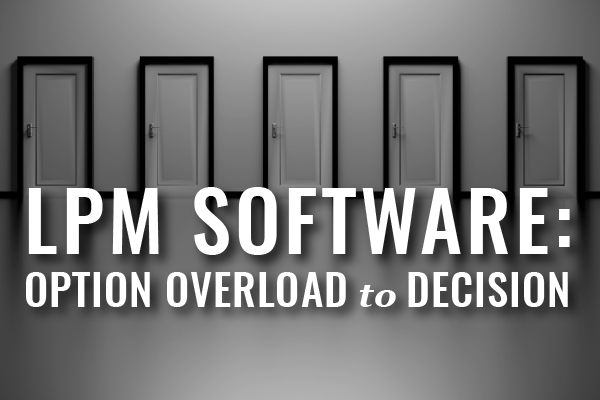Your options for law practice management software grow constantly, making an important decision even more challenging. Here’s what you need to know to make that decision much easier.
We thank the team at Lawyerist.com for this helpful guest post.
There are more law practice management software options today than ever before, and it seems like new options come out every few weeks. With such an abundance of options, deciding which product is best for your firm can be a challenge. Here’s what we think you need to do in order to meet that challenge and choose practice management software for your firm.
First, you have the right to expect a few things of your software providers. We call it a “bill of rights” for legal software. You should expect that:
- The price of legal software shall be published.
- There shall be a free trial, which shall be easy to get started.
- If software requires onboarding, onboarding should not cost extra.
- Security measures shall be clearly described.
- It must be possible to export data in a useful format.
Second, identify your requirements for law practice management software in two lists: must-have and nice-to-have features. Be prepared to be flexible; different software may offer the “same” feature in different ways. And remember: software is a tool, not a silver bullet. No software is going to do everything for you. (Although some software will do some things for you!) Check out this post from Heidi for more on making your list.
Third, compare the options with our law practice management software comparison chart. It identifies key features of all the software in our directory so you can identify the products that may meet your requirements. With the chart in hand, you should be able to narrow the options to 2 or 3. Once you know which seem most likely to meet your firm’s needs, sign up for a trial account with each and give them a try.
Here are some tips for your trial period. Don’t just poke around. Use a sample case and take it through each step in your process, from intake to outcome. Try to go through the same steps in each of the options you are testing. If the software offers advanced or unusual features, make sure you test them out, too.
You may be tempted to try to find the “best” software. Don’t. There is no such thing. Every product is different, and every product has lawyers that love it and those who don’t.
When asking other lawyers for recommendations, be strategic. Find out what they like about the software they actually use, and what complaints they have. If they are using it despite their complaints, find out why. (Sometimes the biggest fans also have the biggest complaints.) Compare their firm and its software requirements to your own list so you know whether their complaints are relevant to you.
If everyone at the firm is bought in to adopting new software, make a choice and commit to learning to get the most from your choice.
Related Resources:
Tips for Evaluating Practice Management Software (Mass LOMAP Blog)
Keys for Finding the Right Practice Management System(ABA Law Practice Today, 2021)
20 Best Legal Case Management Software Programs for Small and Medium Law Firms (Finances Online)
Legal Case Management Software Listing and Reviews (Capterra)
Law Practice Management Software section in our Mass LOMAP Startup Kit
This post was delivered by Sam Glover and the Lawyerist.com team. Lawyerist is home to the largest online community of solo and small-firm lawyers in the world, where we help lawyers start, manage, and grow successful practices.
Free & Confidential Consultations:
Lawyers, law students, and judges in Massachusetts can discuss concerns with a law practice advisor, licensed therapist, or both. Find more on scheduling here.




